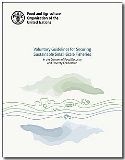Small-scale fishers, fish workers, their organizations and the communities they are part of, are right holders, according to the human rights-based approach (HRBA). They need to know their rights and be able to claim them. For instance, they should be able to participate in decision-making processes in a non-discriminatory and transparent manner. They also need to be aware of ways to claim their right to food, to an adequate standard of living, and to decent working conditions, among others.
States, the private sector, inter-governmental organizations and others are duty bearers, according to the HRBA. They have a duty to respect, fulfil and protect the human rights of the right holders.
The HBRA is a must for securing sustainable small-scale fisheries. Any project or programme supporting small-scale fisheries needs to promote and protect human rights, and empower right holders to hold duty bearers accountable. The work must follow international human rights standards. Learn more about the HRBA in the information box.
The human rights-based approach and the SSF Guidelines
The SSF Guidelines are based on universal human rights norms. The guiding principles of the SSF Guidelines include non-discrimination, gender equality and equity, consultation and participation, rule of law, transparency, accountability and respect of cultures, among others.
The SSF Guidelines need to be understood and applied through promoting a HRBA and following internationally accepted human rights standards. Duty bearers and right holders have to work together. This requires strengthening political will. It also requires enabling small-scale fishers and fish workers to voice their concerns and needs.
Efforts to implement the SSF Guidelines through a HRBA may need to address structural issues. Laws and policies need to be developed and reformed. Institutions, organizations and communities at both national and local levels need to be empowered.
The SSF Guidelines strive to achieve sustainable small-scale fisheries through a human rights-based approach. Chapter 3 in the SSF Guidelines describes the guiding principles.
What is the human rights-based approach?
The human rights-based approach (HRBA) is a framework for human development. It seeks to analyse the inequalities that lie at the heart of development and address them. Three 'lenses' are key when implementing this approach:
- It is based on international human rights standards. The overall objective is to promote and protect human rights. Vulnerable and marginalized people are in focus.
- Any programmes or projects following this approach must respect the human rights principles of participation, accountability, non-discrimination, transparency, human dignity, empowerment and the rule of law. These principles apply to the design, implementation, monitoring and evaluation of programmes and projects, in order to improve targeting, efficiency, effectiveness and the quality of the outcomes.
- Rights, duties, responsibilities and accountability mechanisms are promoted by developing the capacity of duty bearers to meet their obligation and of right holders to claim their rights.
Source: Exploring the human rights-based approach in the context of the implementation and monitoring of the SSF Guidelines, FAO 2016
SSF Guidelines video on community-based fisheries management
Related publications
Related news

Legislation for small-scale fisheries - Launch of SSF-LEX
13/12/2022

FAO-OOH Partnership to Strengthen the Recognition and Protection of the Human Rights of Small-Scale Fishers and their Communities in 2022
10/12/2021

The new edition of the Samudra report on Building Back and Building Forward (No. 83, Sept. 2020)
09/10/2020
Get to know the SSF Guidelines
- Responsible governance of tenure
- Sustainable resource management
- Social development and decent work
- Value chains, post-harvest and trade
- Gender equity and equality
- Disaster risk and climate change
- Indigenous peoples and small-scale fisheries
- Food security and nutrition
Contact







